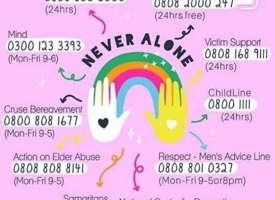Well-being for staff
There are always many demands on our time, tasks that need completing, paperwork that has somehow mounted up, tidying, filing, ordering, the list could become endless. Even when we are not facing a global pandemic there are times for all of us when it is easy to lose a sense of peace and when that happens it is much easier for worry, fear and all sorts of other unhelpful feelings to get a grip. Ultimately, when that happens, we can feel robbed of our joy and hope.
Within Aquila we want to support our staff and children and protect, as far as possible, people’s mental health. Sometimes it is necessary to remind ourselves and each other to make a time to stop, relax, recuperate and replenish your inner wells of hope and joy. You need to look after yourselves and your families and use some of your time to experience nature, music, creativity, reading for pleasure, or going for a run or a walk.
We recognise that this may not be enough, so we have signposted other resources and services in this section of the website.
We have very few cases of staff feeling bullied by other staff, but have included the link to the whistleblowing policy as this provides the process for reporting incidents. In the, hopefully, very rare case that you don’t feel able to speak to your line manager or to follow the process in the whistle blowing policy, please report the bullying through the form below.
Children’s mental health and well-being for Aquila Schools
Introduction
Data collected between 1999 and 2004 found that 10% of children experience a mental health condition that could lead to a diagnosis. For children between 5 and 10 years old data shows that 10% of boys and 5% of girls were experiencing mental health problems, increasing to 13% in boys and 10% for girls between the ages of 11 to 16. With referrals to local Child and Adolescent Mental Health Service having doubled between 2010-2011 and 2014-2015, and with 90% of school leaders reporting increased prevalence of mental health conditions in schools suggest that the level of mental health difficulties experienced by schools is on the increase.
Children who experience mental health issues are likely to show poorer social relationships, physical health and educational attainment, which can have a negative impact on the child’s life outcomes. It is thought that of those children who require support to help them manage their well-being, 70% do not receive critical support at the right time to help achieve good social and educational outcomes, due to shortage of resources and lack of awareness in schools of mental health conditions.
While many mental health issues present themselves when children enter and leave adolescence the Aquila, the Diocese of Canterbury Academies Trust (Aquila) recognises that providing a primary education which promotes resilience, where staff have an understanding of mental health conditions, together with risk factors which could lead to the presence of mental health issues, and have access to resources to promote good mental health and wellbeing, will help children manage and cope with life events, equipping them with the coping skills to manage the transitions to secondary school and adult life..
To support children’s mental health and well-being, Aquila will offer all schools within the trust a package which aims to:
- Help schools identify those children who are experiencing mental health difficulties
- help schools work with parents to support mental health and well-being
- promote a system within the trust where schools can share their expertise or experience of working with children that promotes wellbeing in children
- support schools to implement a range of evidence based interventions to support wellbeing and resilience
- utilise the support of the trust’s educational psychologists to work with schools, families and children to support wellbeing
- develop a database of interventions that schools can utilise at a whole school, class or individual level to support mental health and wellbeing
Aquila recognises that schools offer a ‘universal level’ and as such do not offer a level of support which aims to replace that offered by the health service. However, with children spending a majority of their day at school means that adults in the school have a good level of understanding of children’s needs and can offer additional support under the close supervision of relevant professionals.
The offer to the schools will consist of three levels of support:
- Level 1: Awareness training where schools will be offered the chance to attend training where they will develop their knowledge and understanding of mental health difficulties in children based on current data. This will equip school to identify and prioritise their schools needs in terms of further training and support.
- Level 2: Training will be offered to schools which will allow them to implement psychological theories in their schools allowing them to identify strategies to support children and how to monitor their progress. This training will utilise the Kolb learning model to support learning. Therefore, training will be offered by:
- Step 1 is where theories and concepts will be introduced and examples given of practice
- Step 2 is where attendees return to the schools and implement what they have learnt
- Step 3 is where attendees come together to learn and share their experiences of implementing the training
- Level 3: This is support offered by relevant professionals, such as the Trust’s educational psychologist, which can be used to support the school at a strategic level, or to support children, families and adults on a one to one level.
Level 1 support
Training on mental health difficulties in schools – Schools will have the opportunity to access training which gives schools an understanding of mental health in schools. Attendees will come away with an understanding and those most at risk of future mental health difficulties and protective factors.
Level 2 support
Attachment in schools training – Schools will be able to access yearly training that aims to support a school’s understanding of attachment needs of children. The training will introduce an attachment observation schedule, which will help schools identify the needs of the child, and the impact of interventions and strategies
Resiliency – Schools will be able to access yearly training which will introduce resilience. Attendees will come away with an understanding of the different components of resilience and their application in schools. There will also be opportunities to explore different tools schools can use to support resilience in schools through resilience mapping to resilience coaching.
Implementing Cognitive Behavioural Approaches – Yearly training will be offered to schools on designing and setting up a manualised cognitive behavioural programme in schools. Attendees will come away with an understanding of the model of cognitive behavioural therapy and how to apply it with groups of children. To attend this course those who wish to commit to putting in place a CBA approach in their school must commit to a supervision programme.
Supporting bereaved children and families – This training will equip schools to support children and families who are experience bereavement.
Level 3 support
Services offered by the educational psychologist can be used through the school’s time allocation or through the allocation identified by the trust, i.e. to support training. In exceptional circumstance the trust (e.g. a critical incident), decided by the trust’s CEO and educational psychologist), may offer additional support beyond this allocation based on the school’s needs. The educational psychologist can offer:
- One to one CBA work with children who display a high level of need
- Video Interactive Guidance (VIG) – an evidence based programme that aims to build on positive communication between children and other children, or children with adults
- School based reviews – an opportunity for members of the school’s SLT to meet with the educational psychologist to help decide on best ways forward to support wellbeing in children in particular where there are concerns around groups of children or where schools own data analysis identified priorities
- SENCO Forum – to provide SENCos with a forum to discuss best practice in their schools and to learn and share from each other’s experiences.
- Maintain a set of resources that schools can use to support mental health and wellbeing that can be used at the whole class or whole school level, such as lesson plans.
- Resiliency coaching – This could be offered to children and adults.
- Consultations with the educational psychologist – An opportunity for class teachers to consult with an educational psychologist to help identify and put in place strategies to support wellbeing in children.
- Critical incident support– A critical incident is when a sudden and unplanned event happens at the school that has the possibility to effect children, families and the community. Events which are determined to be critical will take precedent over all other work and will consist of visits by the educational psychologist to support the schools, children and families, when it is necessary or appropriate to do so.
Review and outcomes of the strategy
Aquila will undertake regular reviews of the strategy through:
- Feedback from training events
- Annual surveys to the SLT of schools in the Trust to help identify prioritise for the next academic year
Sources
Wise Up – Prioritising wellbeing in schools. Young Minds
Royal College of Paediatrics and Child Health (https://www.rcpch.ac.uk/news-events/news/mental-health-what-changes-do-we-want-see)
Annual Report of the Child Medical Officer 2012, Our Children Deserve Better: Prevention Pays, Chapter 10.
Department for Education (November 2018) Mental health and behaviour in schools.
Staff Counselling Support
Staff Care Services
Documents
| Page Downloads |
|---|
| Mindfulness Handouts 19 Conference |


